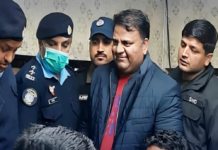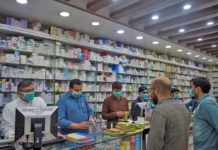Sindh Chief Minister Syed Murad Ali Shah, in his meeting with a high-power World Bank delegation led by its Regional Vice President for South Asia Martin Raiser, presented a $1.1 billion rescue and rehabilitation plan for the flood/rains devastated people in the province.
“Out of 140,914 square kilometer area of the province, the heavy rains/floods have inundated 15.39 percent or 21,691.7 square km and out of 66,549 populated area [of the province] 18.8 percent or 12,541.6 square kilometers has been submerged,” the CM said, and added such a magnitude of the devastation was not only unprecedented, and that it would cost billions of rupees to rehabilitate the people, their agriculture, infrastructure and to create a source of income for the poorest of the poor.
The meeting at the CM’s House was attended by WB Senior Operations Officer Ewa Sobczynska, Country Director Najy Benhassine, Operations Manager Gailius J Draugelis, program leaders Abedalrazq F Khalil, Tobias Akhtar Haque and Ahsan Tehsin. The CM was assisted by his cabinet members, Dr. Azra Pechuho, Nasir Shah, Zia Abbas Shah, Advisors Manzoor Wassan, Murtaza Wahab, Rasool Bux Chandio, Special Assistant Haris Gazdar, chief secretary Sohail Rajput, Chairman P&D Hassan Naqvi, and concerned provincial secretaries
At the outset of the meeting, World Bank South Asian chief Martin said that he had visited Dadu, Jamshoro and other areas and had never seen such a flood situation and humanitarian crisis. He added that his donor agency [WB] would play its due role to support the provincial government to steer its affected people out of the crisis.
Housing Sector: The chief minister said that the floods have collapsed 1.7 million houses that need to be constructed after dewatering villages and towns. He added that the construction of such a large number of houses would cost at least $500 million. Murad said that he was trying to return people to their homes before the advent of winter. “The winter would create more problems for the people living in the tents or along the roads,” he said.
The World Bank South Asian chief said that his experts and the concerned officers of the Sindh government sit together and prepare a project along with its cost, time, and technology of construction so that the project could be sent to the bank authorities for approval.
Irrigation network: CM Murad said that the floods and heavy rains have damaged dams/spoil ways and their allied structure, barrage headworks, canal, channels, drains, flood protection buds, building structures, and tube wells and pumps. He added that according to the initial assessment the rehabilitation of the irrigation network would cost around Rs94.7 billion. Murad Ali Shah urged the World Bank to re-appropriate or provide at least $250 million so that the irrigation network could be repaired, otherwise not only agro-economy would suffer but the people engaged in the agriculture sector would collapse. The World Bank chief asked the chief minister to submit the proposal for their approval.
Water supply: Murad told the visiting donor agency’s South Asian head that 23 districts have been affected. The heavy rains/floods have destroyed water and draining systems in big and small-town ad villages. The repair and rehabilitation of the water supply and drainage schemes would cost around $100 million. The CM said that he wanted to start work on the water supply and drainage schemes as soon as the water was pumped out of the town and villages. The World Bank chief told the chief minister to submit a working paper for consideration. At this, Chairman P&D Hassan Naqvi said that the papers were ready, and he would submit them.
Municipal roads: The chief minister said that the heavy rains have destroyed municipal roads in 102 talukas and 5727 dehs – which means the entire network known as municipal roads had completely collapsed. He added that he has visited all the affected areas and witnessed the roads could no long be used. Murad said that at least $100 million would be required to reconstruct municipal roads. The World Bank team suggested the submission of the details of the roads so that the project could be considered and approved.
Income generation: Murad said that the floods have killed over 12,000 cattle- the only source of income for the poorest of the poor. Various poor flood people after being displaced also lost their source of income. “I want to start schemes to provide financial support to the poorest of the poor, male as well as female so that they start their income-generating activities such as selling fruit/vegetables on push carts, embroidery work by womenfolk and such other activities.”
Murad said that the income generating and livelihood scheme would cost $1 million. At this, the World Bank delegation appreciated the plan and urged the chief minister to get its working paper submitted for approval.







